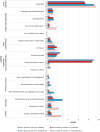Hard work, long hours, and Singaporean young adults' health-A qualitative study
- PMID: 37377556
- PMCID: PMC10291095
- DOI: 10.3389/fpubh.2023.1082581
Hard work, long hours, and Singaporean young adults' health-A qualitative study
Erratum in
-
Corrigendum: Hard work, long hours, and Singaporean young adults' health-A qualitative study.Front Public Health. 2024 May 6;12:1409963. doi: 10.3389/fpubh.2024.1409963. eCollection 2024. Front Public Health. 2024. PMID: 38770359 Free PMC article.
Abstract
Background: As young adults in their 20s to 30s transitioning toward new careers and independence, their dietary and physical activity practices often change, increasing their risk of weight gain. This study explored the ways that Singaporean young adults perceived and experienced the interaction between their working hours, work, and health practices.
Methods: This research used semi-structured interviews to explore the perspectives and experiences of participants. Purposive and snowball sampling was used to recruit 15 men and 18 women, aged 23 to 36, who had worked full-time at their respective jobs in Singapore for at least 1 year. An inductive and deductive thematic analysis approach was employed.
Results: Young working adults' commitment to work was driven by a hard-working culture, a desire to attain better jobs and remuneration, and to fulfill cultural expectations to support their multi-generation families. Their non-work time was largely spent recuperating from work by socializing over food and in sedentary activities.
Conclusion: For young working adults, long work hours are normalized, even though they are a barrier to healthy diets and physical activity. Existing social and institutional norms support a culture that values commitment to work and encourages young adults to devote long hours to building a sound financial future and achieving personal and cultural aspirations. These findings have implications for long-term population health and should be considered in health promotion activities targeting young adults and barriers.
Keywords: burden of disease; diet; health practices; health promotion; obesity; physical activity; preventing non-communicable diseases; work time.
Copyright © 2023 Leu, Rebello, Sargent, Kelly and Banwell.
Conflict of interest statement
The authors declare that the research was conducted in the absence of any commercial or financial relationships that could be construed as a potential conflict of interest.
Figures



References
-
- Health Promotion Board . National Nutrition Survey 2010. Singapore: Health Promotion Board. (2010). p. 163.
-
- Lau JH, Nair A, Abdin E, Kumarasan R, Wang P, Devi F, et al. . Prevalence and patterns of physical activity, sedentary behaviour, and their association with health-related quality of life within a multi-ethnic Asian population. BMC Public Health. (2021) 21:1939. 10.1186/s12889-021-11902-6 - DOI - PMC - PubMed
-
- Epidemiology & Disease Control Division, Ministry of Health, Republic of Singapore . National Population Health Survey 2020 (Household Interview and Health Examination). Singapore: Ministry of Health; (2021).
-
- Institute of Health Metrics and Evaluation . Singapore Washington: University of Washington; (2022). Available online at: https://www.healthdata.org/singapore (accessed June 23, 2022).
Publication types
MeSH terms
LinkOut - more resources
Full Text Sources
Research Materials

